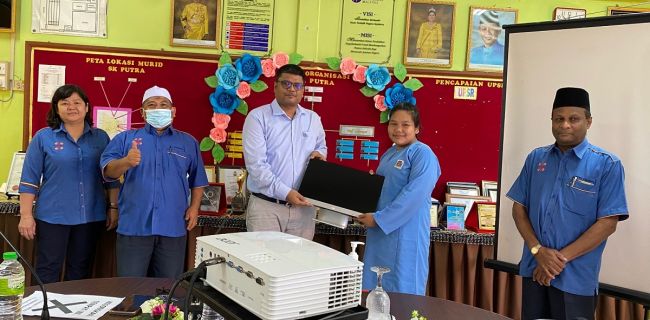Malaisie : solidarité syndicale pour un enseignement à distance pour les étudiant·e·s marginalisé·e·s
Le centre caritatif du NUTP fournit aux étudiant·e·s des outils et des ressources pour l’enseignement et l’apprentissage à distance. C’est un service essentiel car plus de 30 % des étudiant·e·s en Malaisie n’ont pas accès à des outils tels que les ordinateurs, les smartphones ou une connexion internet. Cela limite leur accès aux cours en ligne pendant la pandémie de COVID-19, selon le NUTP.
Le centre caritatif du NUTP a été créé pour aider les parents à obtenir des outils pour leurs enfants, leur permettant de participer à des activités d’enseignement et d’apprentissage à domicile.
Le centre caritatif contribue à réduire la fracture numérique
« La crise de la COVID-19 n’est pas seulement une crise sanitaire ou économique, mais aussi une crise humaine et éducative », a expliqué le Secrétaire général Harry Tan. « Par cette initiative, le NUTP souhaite aider les étudiants et étudiantes à poursuivre leur scolarité pendant la pandémie et à éviter les abandons scolaires. »
Depuis le lancement de l’initiative, le NUTP a pu fournir à plus de 50 étudiant·e·s des ordinateurs portables ou de bureau (équipés au minimum d’applications Windows 7), ou des smartphones avec accès à des applications telles que WhatsApp et Zoom Meeting.
Internationale de l’Éducation : le dialogue avec les syndicats d’enseignants est nécessaire pour éviter les abandons scolaires
Le bureau régional Asie-Pacifique de l’Internationale de l’Éducation (IEAP) s’est joint à l’initiative du NUTP et a fourni des ordinateurs de bureau, des sacs et des fournitures scolaires à une école accueillant des élèves Orang Asli (communauté indigène). Le responsable de l’école, Syed Zulkafli Syed, a déclaré au NUTP et à l’Internationale de l’Éducation que plus de 40 % des élèves de la communauté Orang Asli de cette école venaient de milieux extrêmement pauvres et ne pouvaient pas accéder aux cours en ligne en raison d’un manque d’ordinateurs et de connexions à Internet.
Anand Singh, coordinateur régional en chef de l’IEAP, a souligné que, alors que le gouvernement malaisien prétend encourager l’utilisation des outils numériques pour s’assurer que l’enseignement et l’apprentissage ne sont pas affectés, « la pandémie de COVID-19 exacerbe les écarts numériques, entre les zones rurales et urbaines et entre les genres ».
Dans la plupart des pays de la région Asie-Pacifique, « le système d’enseignement public dispose d’une infrastructure médiocre, beaucoup d’étudiants ne disposent pas des outils nécessaires pour accéder à l’apprentissage en ligne, tels que les ordinateurs ou les smartphones, et trop d’étudiants, en particulier ceux issus des couches marginalisées de la société et des zones rurales, n’ont pas accès à l’internet dans la plupart des cas », a-t-il ajouté.
Les gouvernements devraient trouver des moyens, en consultation avec les enseignant·e·s et leurs syndicats, de rouvrir les écoles tout en garantissant la santé et la sécurité des enseignant·e·s et des élèves. Sinon, le nombre d’enfants non scolarisés augmentera, de même que le travail des enfants, les disparités entre les genres et les abandons scolaires, a prévenu Singh.

[Thu, 10 Dec 2020 09:48:00 +0000] | DIGG THIS
Website Development and Design by Cyblance
